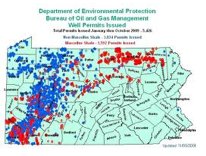Marcellus Shell Games.
Posted By Cliff Tuttle | July 23, 2011
No. 659
 After the Civil War the industrial revolution came to Western Pennsylvania big time. Coal, which had been previously been extracted for home heating from small “country bank” mines began to be mined in bulk and transported by rail to steel mills. Meanwhile, the oil industry sprung up in Titusville and commercial gas wells were being drilled in large numbers. The technology for producing and distributing natural gas for residential heating and cooking was quickly developed, some of it by George Westinghouse, who actually drilled a well in his back yard on Penn Avenue, much to the alarm of his neighbors.
After the Civil War the industrial revolution came to Western Pennsylvania big time. Coal, which had been previously been extracted for home heating from small “country bank” mines began to be mined in bulk and transported by rail to steel mills. Meanwhile, the oil industry sprung up in Titusville and commercial gas wells were being drilled in large numbers. The technology for producing and distributing natural gas for residential heating and cooking was quickly developed, some of it by George Westinghouse, who actually drilled a well in his back yard on Penn Avenue, much to the alarm of his neighbors.
With over 150 years of experience in gas production, you would think that our region would be pretty comfortable with the subject. But apparently not. The recent boom in Marcellus Shale gas leasing and operation has stirred a lot of controversy. South Fayette Township recently joined a growing list of municipalities that are adopting comprehensive ordinances seeking to regulate the industry within its borders. Although the State has comprehensive regulations which would seem to pre-empt local ordinances, the courts have permitted local regulation. And the City of Pittsburgh and, recently, Wilkinsburg Borough have entirely banned Marcellus drilling from their jurisdiction. This is due to environmental concerns, including fears that fracking fluids will pollute our drinking water.
Before we allow the public discourse to be driven by panic, its worth remembering a few simple facts.
1. Oil and gas drilling and production is heavily regulated in Pennsylvania. State inspectors are everywhere and they have the power to impose heavy fines when environmental laws and regulations are not observed. This includes regulations protecting the groundwater.
2. The Marcellus Shale formation contains vast amounts of gas at great depths. To economically extract it, large lease acreages are required. The cost of operation is extremely expensive. When supply exceeds demand, as it does now, many gas wells are shut in for months or may not generate sufficient pressure to flow into the pipeline.
4. This means that the Marcellus gas fields are going to be developed over time. Despite the rush for leases, the truth is that only a comparatively small number can be developed immediately. In this respect, a Marcellus field is like an underground coal field. Acquisition of a sufficient leasehold acreage must precede development to enable the vertical drilling to occur. This process is likely to still be going on a century from now.
5. In addition, gas wells must be connected to a network of pipelines. This transports the product to market. Although future lines will undoubtedly be constructed, this will take time and investment.
CLT



